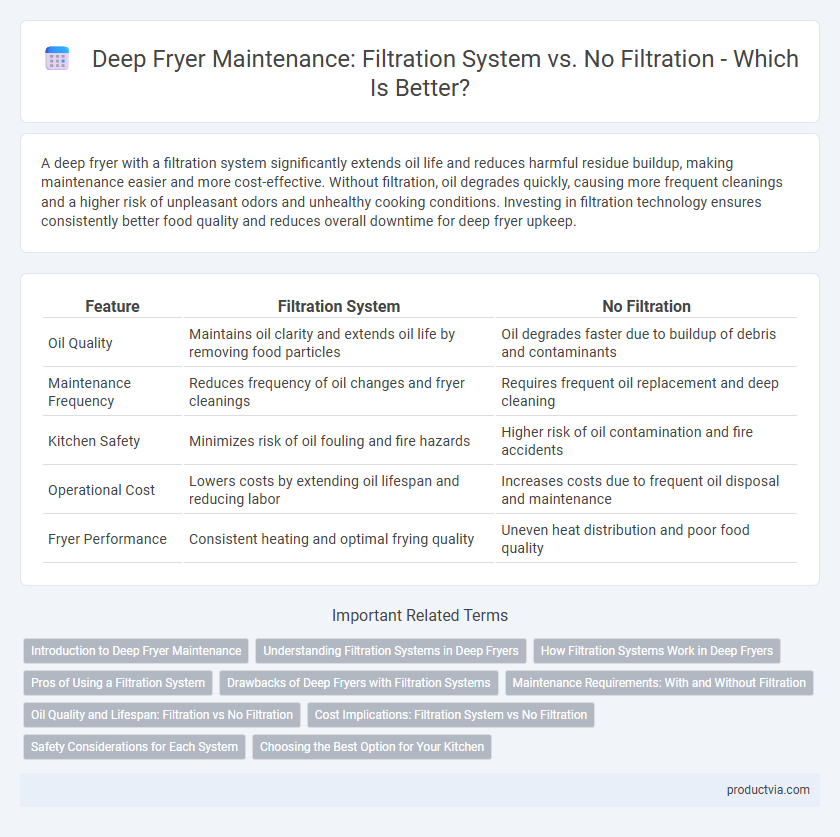A deep fryer with a filtration system significantly extends oil life and reduces harmful residue buildup, making maintenance easier and more cost-effective. Without filtration, oil degrades quickly, causing more frequent cleanings and a higher risk of unpleasant odors and unhealthy cooking conditions. Investing in filtration technology ensures consistently better food quality and reduces overall downtime for deep fryer upkeep.
Table of Comparison
| Feature | Filtration System | No Filtration |
|---|---|---|
| Oil Quality | Maintains oil clarity and extends oil life by removing food particles | Oil degrades faster due to buildup of debris and contaminants |
| Maintenance Frequency | Reduces frequency of oil changes and fryer cleanings | Requires frequent oil replacement and deep cleaning |
| Kitchen Safety | Minimizes risk of oil fouling and fire hazards | Higher risk of oil contamination and fire accidents |
| Operational Cost | Lowers costs by extending oil lifespan and reducing labor | Increases costs due to frequent oil disposal and maintenance |
| Fryer Performance | Consistent heating and optimal frying quality | Uneven heat distribution and poor food quality |
Introduction to Deep Fryer Maintenance
Regular deep fryer maintenance is crucial for optimal performance and food quality. A filtration system in a deep fryer helps remove impurities and extends oil life, reducing the frequency of oil changes and improving food taste. Fryers without filtration require more frequent oil replacement, leading to increased operational costs and potential inconsistencies in frying results.
Understanding Filtration Systems in Deep Fryers
Filtration systems in deep fryers extend oil life by removing food particles and contaminants, reducing the frequency of oil changes and improving food quality. Fryers without filtration require more frequent oil replacement, increasing operational costs and downtime. Proper filtration ensures consistent cooking temperatures and preserves oil integrity, enhancing overall fryer performance.
How Filtration Systems Work in Deep Fryers
Filtration systems in deep fryers operate by continuously or periodically removing food particles, oil debris, and contaminants through specialized filters, thereby extending oil life and improving food quality. These systems utilize mesh screens, paper filters, or centrifugal technology to trap impurities and maintain oil clarity, reducing the frequency of complete oil changes. Without filtration, accumulated residues degrade oil faster, leading to off-flavors, increased oil consumption, and more frequent maintenance requirements.
Pros of Using a Filtration System
Using a filtration system in a deep fryer extends oil life by removing food particles and contaminants, leading to cost savings and consistent cooking quality. It reduces the frequency of oil changes and minimizes downtime caused by maintenance, enhancing operational efficiency in busy kitchens. Oil filtration also improves food flavor and fryer performance, contributing to a safer and more hygienic cooking environment.
Drawbacks of Deep Fryers with Filtration Systems
Deep fryers with filtration systems often require regular filter media replacement, which increases operational costs and downtime. These systems can cause oil degradation if filters are not changed timely, leading to compromised frying quality. Moreover, the complexity of filtration units may lead to higher maintenance demands and potential mechanical failures.
Maintenance Requirements: With and Without Filtration
A deep fryer with a filtration system significantly reduces maintenance requirements by automatically removing food particles and oil debris, extending oil life and decreasing cleaning frequency. Without filtration, frequent oil changes and manual cleaning become necessary due to faster oil degradation and accumulation of contaminants. Implementing a filtration system optimizes operational efficiency and reduces downtime associated with maintenance tasks.
Oil Quality and Lifespan: Filtration vs No Filtration
Using a filtration system in a deep fryer significantly improves oil quality by removing food particles and impurities that degrade oil faster. Filtration extends the oil's lifespan, reducing the frequency of oil replacement and lowering operational costs. In contrast, no filtration leads to quicker oil breakdown, increased absorbance of off-flavors, and compromised food quality.
Cost Implications: Filtration System vs No Filtration
A deep fryer with a filtration system reduces oil waste by extending oil life, which lowers the frequency and cost of oil replacement. Without filtration, increased oil degradation leads to higher operational expenses due to more frequent oil changes and potential impacts on food quality. Initial investment in filtration technology may be offset by long-term savings on oil costs and improved fryer maintenance efficiency.
Safety Considerations for Each System
A deep fryer with a filtration system enhances safety by reducing oil degradation and minimizing the risk of fire hazards caused by accumulated contaminants. In contrast, fryers without filtration require frequent oil changes to prevent harmful buildup that can lead to dangerous overheating and unhealthy food quality. Proper maintenance of both systems is crucial, but filtration systems offer a safer, more controlled environment by consistently removing debris and extending oil life.
Choosing the Best Option for Your Kitchen
A deep fryer with a filtration system significantly extends oil life by removing food particles and impurities, reducing the frequency of oil changes and lowering operating costs. Kitchens without filtration rely on more frequent oil replacement and increased maintenance, which can lead to higher expenses and inconsistent frying quality. Prioritizing a filtration-equipped deep fryer enhances food taste consistency and promotes a cleaner, more efficient kitchen environment.
Filtration System vs No Filtration for deep fryer maintenance Infographic

 productvia.com
productvia.com